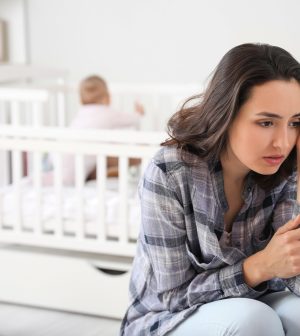- 8 Ways to Increase Dopamine Naturally
- 7 Best Breads for Maintaining Stable Blood Sugar
- Gelatin vs. Collagen: Which is Best for Skin, Nails, and Joints?
- The Long-Term Effects of Daily Turmeric Supplements on Liver Health
- Could Your Grocery Store Meat Be Causing Recurring UTIs?
- Are You Making This Expensive Thermostat Error This Winter?
- Recognizing the Signs of Hypothyroidism
- 10 Strategies to Overcome Insomnia
- Could Artificial Sweeteners Be Aging the Brain Faster?
- Techniques for Soothing Your Nervous System
Postpartum Depression Rates Have Tripled for New Moms During Pandemic

Rates of postpartum depression among American mothers rose nearly three-fold during the COVID-19 pandemic, along with large increases in major depression and thoughts of self-harm, according to a new study.
It included 670 new moms who completed online screening between February and July 2020. One-third screened positive for postpartum depression and 20% had symptoms of major depression.
Before the pandemic, about 1 in 8 new mothers had postpartum depression and between 5% and 7% had major depression, according to the U.S. Centers for Disease Control and Prevention.
“We also found that almost 1 in 5 participants who screened positive for postpartum depression reported having thoughts of harming themselves,” said lead author Clayton Shuman, an assistant professor of nursing at the University of Michigan.
“This is very concerning given that prior to the pandemic, [a previous study] found the rate of suicidality among prenatal and postpartum patients is on the rise in the U.S.,” Shuman said in a university news release.
New mothers who fed their infants formula were 92% more likely to screen positive for postpartum depression, and 73% more likely to screen for major depression than those who breastfed or bottle-fed with their own milk, the study found.
Mothers whose infants were in neonatal intensive care units had a 74% higher risk of postpartum depression, and moms who were worried about contracting COVID-19 had a 71% increased likelihood of screening positive for postpartum depression, according to the study.
Shuman said the findings underscore the need to identify depression in new mothers. But, he added, screening is only a first step.
“Treatment is pivotal to recovery,” Shuman said. “Resources and education about postpartum depression must be better disseminated and implemented. These resources should be shared with the general public to reduce stigma, and shared with those who provide social and emotional support to postpartum patients, such as partners and family members.”
The findings were published March 14 in the journal BMC Research Notes.
This study was part of a larger one called COVID-19 MAMAS (Maternal Attachment, Mood, Ability, and Support) that spawned several papers about pregnancy and postpartum experiences during the pandemic.
More information
There’s more on postpartum depression at the U.S. Office on Women’s Health.
SOURCE: University of Michigan, news release, March 14, 2022
Source: HealthDay
Copyright © 2026 HealthDay. All rights reserved.










